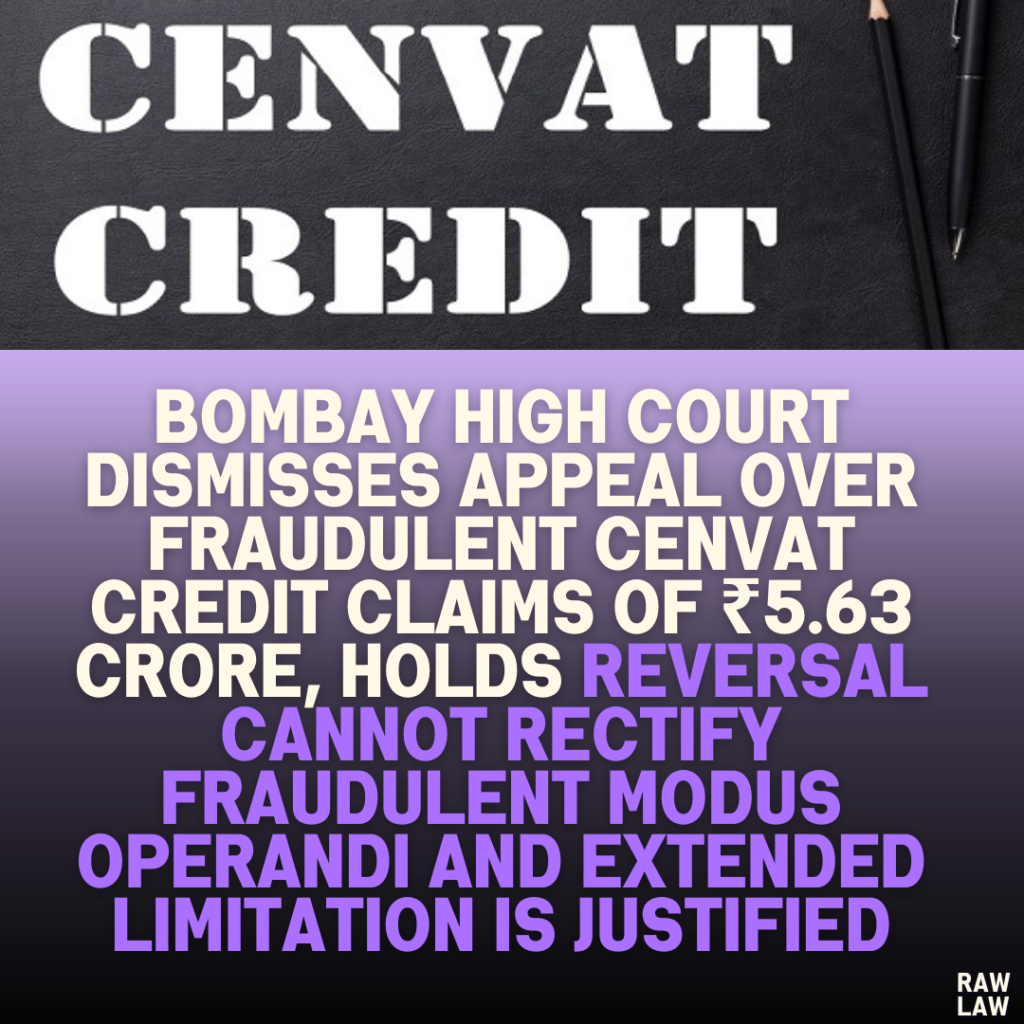Court’s Decision:
The Bombay High Court dismissed the appeal filed by the appellant, challenging the order of the Customs, Excise, and Service Tax Appellate Tribunal (CESTAT), which upheld the recovery of ₹5,63,66,047 as inadmissible CENVAT credit along with penalties. The court ruled that the findings of the adjudicating authority and the Tribunal were based on facts, and no substantial questions of law arose for the High Court to entertain the appeal.
Facts:
- The appellant is engaged in the manufacture of polymer emulsions, which require raw materials like Vinyl Acetate Monomer, imported and stored in customs-bonded warehouses.
- These goods were directly dispatched from the warehouses to customers without entering the appellant’s factory premises, contrary to the CENVAT Credit Rules, which require goods to enter the factory for credit eligibility.
- The appellant issued invoices reflecting that the goods were dispatched from its factory, enabling customers to claim CENVAT credit unlawfully.
- Following an investigation, the authorities issued a show-cause notice dated 5th September 2014, alleging suppression of facts and fraud in availing CENVAT credit.
- The adjudicating authority disallowed the credit of ₹5,63,66,047, ordered its recovery with interest, and imposed penalties, including on the Managing Director of the appellant company.
- The CESTAT upheld the findings of the adjudicating authority, leading the appellant to file the current appeal before the High Court.
Issues:
The appellant raised several issues before the High Court, including:
- Whether the Tribunal erred in holding that reversal of CENVAT credit was invalid because it was in the form of debit entries in the CENVAT register.
- Whether penalties imposed were justified, especially when no loss was caused to the exchequer.
- Whether the invocation of the extended limitation period was valid.
- Whether substantial questions of law arose from the Tribunal’s findings.
Petitioner’s Arguments:
- The appellant contended that it had reversed the CENVAT credit through debit entries in the register and no actual credit was utilized.
- It argued that penalties and interest were unjustified because no revenue loss occurred to the exchequer.
- The appellant challenged the invocation of the extended limitation period, asserting that there was no suppression or fraud.
Respondent’s Arguments:
- The Revenue argued that the appellant fraudulently maintained records to reflect that goods were dispatched from the factory, enabling customers to claim inadmissible CENVAT credit.
- It justified the penalties and extended limitation, citing the appellant’s suppression of facts and fraudulent conduct.
Analysis of the Law:
- Section 35G of the Central Excise Act, 1944:
- Appeals to the High Court are limited to substantial questions of law.
- Questions of fact, such as whether credit was wrongly availed, cannot be re-examined unless they give rise to legal issues.
- The court highlighted that the findings of the adjudicating authority and the Tribunal were factual, leaving no room for intervention.
- CENVAT Credit Rules:
- Goods must physically enter the factory premises for CENVAT credit eligibility.
- The appellant violated these rules by dispatching goods directly from customs-bonded warehouses while maintaining records to reflect factory entry.
- Precedents Cited:
- CIT v. Tata Chemicals Ltd. (2002) 256 ITR 395: The High Court can address only those issues raised but left undetermined by the Tribunal. In this case, the appellant failed to establish that the Tribunal overlooked any substantial question of law.
Precedent Analysis:
The court relied on CIT v. Tata Chemicals Ltd., holding that factual disputes decided by the Tribunal cannot be revisited unless they involve substantial legal questions. The court found no such question in the present case, as the Tribunal had conclusively addressed all factual issues.
Court’s Reasoning:
- Reversal of Credit:
- The appellant argued that the CENVAT credit was reversed via debit entries. However, the court noted that this claim was irrelevant since the issue extended to fraudulent documentation and passing of inadmissible credit to customers.
- Fraudulent Modus Operandi:
- The appellant admitted to creating records showing that goods entered the factory when they were directly dispatched from the warehouse. This admission, corroborated by customer statements, demonstrated fraud.
- Penalty Justification:
- The penalty was based on the appellant’s deliberate acts of suppression and fraud. The Tribunal upheld the adjudicating authority’s findings, concluding that the penalties were valid.
- Extended Limitation:
- The extended limitation period under excise laws is applicable in cases of suppression and fraud. The court ruled that the appellant’s actions justified the extended limitation.
- No Substantial Questions of Law:
- The court emphasized that the findings of the adjudicating authority and the Tribunal were factual and did not raise any substantial questions of law for the High Court’s consideration.
Conclusion:
The Bombay High Court dismissed the appeal, holding that:
- The findings of the adjudicating authority and the Tribunal were well-supported by evidence and factual admissions.
- The appellant’s actions, including maintaining false records and passing inadmissible credit, amounted to suppression and fraud.
- The penalties and extended limitation were justified.
- No substantial questions of law arose, as the appeal was primarily based on factual disputes.
The court upheld the recovery of ₹5,63,66,047 as inadmissible credit and the penalties imposed on the appellant.
Implications:
This judgment underscores the importance of compliance with CENVAT credit rules and highlights that:
- Factual findings of adjudicating authorities and Tribunals cannot be challenged before High Courts unless they involve substantial questions of law.
- Fraudulent practices in availing tax credits will attract strict penalties and extended limitation.
- Businesses must ensure accurate documentation and adherence to statutory requirements to avoid disputes and penalties.
